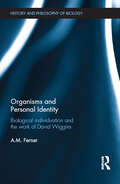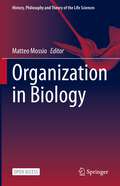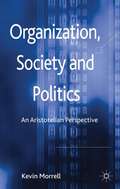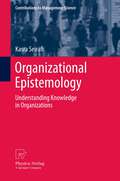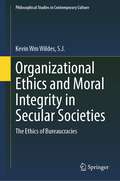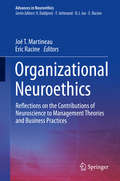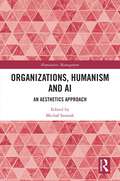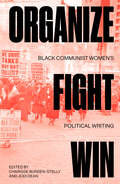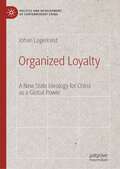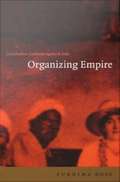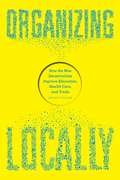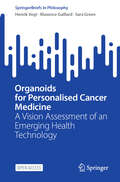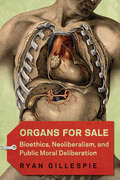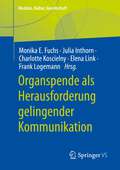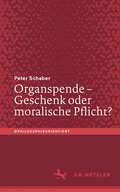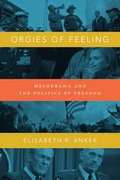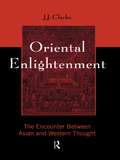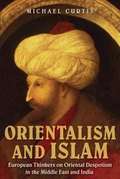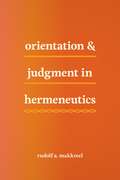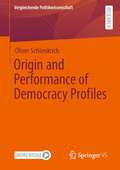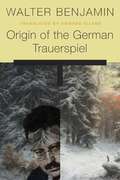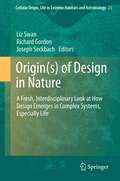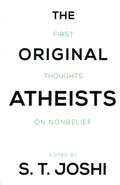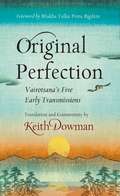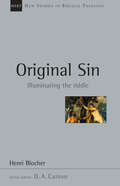- Table View
- List View
Organisms and Personal Identity: Individuation and the Work of David Wiggins (History and Philosophy of Biology)
by A.M. FernerOver his philosophical career, David Wiggins has produced a body of work that, though varied and wide-ranging, stands as a coherent and carefully integrated whole. In this book Ferner examines Wiggins’ conceptualist-realism, his sortal theory ‘D’ and his human being theory in order to assess how far these elements of his systematic metaphysics connect. In addition to rectifying misinterpretations and analysing the relations between Wiggins’ works, Ferner reveals the importance of the philosophy of biology to Wiggins’ approach. This book elucidates the biological anti-reductionism present in Wiggins’ work and highlights how this stance stands as a productive alternative to emergentism. With an analysis of Wiggins’ construal of substances, specifically organisms, the book goes on to discuss how Wiggins brings together the concept of a person with the concept of a natural substance, or human being. An extensive introduction to the work of David Wiggins, as well as a contribution to the dialogue between personal identity theorists and philosophers of biology, this book will appeal to students and scholars working in the areas of philosophy, biology and the history of Anglophone metaphysics.
Organization in Biology (History, Philosophy and Theory of the Life Sciences #33)
by Matteo MossioThis open access book assesses the prospects of (re)adopting organization as a pivotal concept in biology. It shows how organization can nourish biological thinking and practice, by reconnecting with the idea of biology as the science of organized systems. The book provides a comprehensive state-of-the-art picture of the characterizations and uses of the concept of organization in both biological science and philosophy of biology. It also deals with a variety of themes – including evolution, organogenesis, heredity, cognition and ecology – with respect to which the concept of organization can guide the elaboration of original models and new experimental protocols. It will be of interest to biologists and scholars working in philosophy of science alike.
Organization, Society and Politics
by Kevin MorrellThis thought-provoking book will appeal to both specialists and newcomers to Aristotle. Specialists will welcome the attention to original texts that underpin many of our ideas on politics, business studies, and other social sciences, whilst newcomers will appreciate the lucid summaries and applications that make Aristotle fascinatingly accessible.
Organizational Epistemology
by Kasra SeirafiThis book presents an in-depth perspective of knowledge as a fundamental process of any organization rather than just another resource to be managed. The author presents a process-oriented theory of creating and applying knowledge directed towards both researchers and practitioners. In this book the author develops normative knowledge management guidelines which draw from a unique view on knowledge, discussed in the field of philosophy since Plato but neglected by most knowledge management authors - by applying a philosophically grounded 'social epistemology' to organizations. The guidelines in this book call for an open and reflective space of knowledge creation, aligned with goals and structures of the organization. Numerous examples, field studies, and an application to the main case study on Seven-Eleven Japan complement both the descriptive view on knowledge as well as the normative guidelines presented in this book.
Organizational Ethics and Moral Integrity in Secular Societies: The Ethics of Bureaucracies (Philosophical Studies in Contemporary Culture #29)
by Kevin Wm Wildes, S.J.This book explores an undeveloped area in postmodern thought: organizational ethics. Ethical debates and analyses usually focus on a particular act or action, an actor, and/or how a secular society should address any of those particular persons or events. In the Post Modern age, ethical decisions and policies are characterized by moral and cultural pluralism. However, there is a second factor that complicates ethical and policy decisions even further. This book argues that in the postmodern age ethical decisions often need to be understood as part of the decision making of organizations and bureaucracies. Organizational decisions often have direct bearing on the choices made by individuals. Two areas that exemplify postmodern issue are the areas of health care and education. For example the decision making of Admissions Officers in American higher education, are influenced by decisions that have been made by the university about the size of the class and the diversity of the class. Health Care organizations make policy decisions that affect every aspect of a patient’s care from admission to treatment and the types of care that are or are not offered. Both education and health care are the object of the significant investment of resources, both areas are value laden in postmodern, pluralistic societies, and yet we do not have a comprehensive method to understand them or evaluate them. This book is of interest to bioethicists, physicians, nurses, health care policy students, educational policy experts, students and government regulators.
Organizational Neuroethics: Reflections on the Contributions of Neuroscience to Management Theories and Business Practices (Advances in Neuroethics)
by Eric Racine Joé T. MartineauUnderstanding and improving how organizations work and are managed is the object of management research and practice, and this topic is of longstanding interest in the academia and in society at large. More recently, the contribution that the study of the brain could make to, notably, our understanding of decisions, emotional reactions, and behaviors has led to the emergence of the field of “organizational neuroscience”. Within the field of management, organizational neuroscience seeks to explore linkages between neuroscience research, theories, and methods and management research. Its primary goal is to incorporate findings on the cognitive processes underlying the thoughts, behaviors and attitudes of organizational actors in order to better inform management theories, and to assist in understanding, predicting and improving these behaviors in the workplace. As a result, we have seen in the last decade a flurry of research projects and publications in organizational neuroscience, as well as novel or rejuvenated innovations around neuromarketing, neuroleadership, and cognitive enhancement in the work place, to name a few. However, research and practical applications in organizational neuroscience pose profound ethical challenges about, for example, organizational responsibility in the responsible use of scientific innovation. Drawing on recent debates in the field, and in response to upcoming ethical challenges of organization neuroscience, this book introduces “organizational neuroethics” as an emerging interdisciplinary field that addresses the ethics of organizational neuroscience research and applications, as well as the neuroscience of organizational ethics. The first part focuses on the ethics of organizational neuroscience and several chapters tackle the ethics of neuromarketing or neuroleadership and discuss the ethical issues associated with neuroenhancement practice in the workplace. The second part of the book addresses cutting-edge topics in the neuroscience of organizational ethics. Written by international experts in the fields of management, neuroscience, ethics, and social science, this book will be of prime interest to practitioners, researchers and students in the various fields concerned with improving management research and practices, as well as organizational ethics.
Organizations, Humanism and AI: An Aesthetics Approach (Humanistic Management)
by Szostak MichałThis volume explores the role of the aesthetics of the synergy between humanism and artificial intelligence (AI) on the level of institutions and organisations, influencing individuals’ well-being. Grounded in the principles of the humanistic management paradigm—emphasising sustainability, social organisations and entrepreneurship, conscious capitalism, and the protection of human dignity—it investigates how aesthetic principles (harmony, transparency, emotional resonance, cultural adaptability, or depth insights), applied between a human-centric approach and the use of AI-powered solutions, may help shape public perceptions, foster trust, and affect the quality of institutions within politics, governance, media, and social services. An aesthetic perspective becomes crucial as AI’s influence expands, shaping governance mechanisms, media, social interactions, and societal organisation. It enables a critical examination of the challenges, risks, and opportunities arising from this growing role, ensuring a responsible, conscious, and balanced approach to AI’s integration into public life. Through theoretical insights, conceptual frameworks, practical case studies, and empirical investigations, it highlights the transformative potential of aesthetics. This book follows a progressive analytical approach, beginning with macro-level institutional frameworks (politics and governance), moving through public discourse (media and perception), and concluding with micro-level applications (social care and well-being). This structured narrative presents a coherent examination of key aspects demonstrating how aesthetic considerations influence the synthesis between the humanistic approach and AI in different domains of societal life.
Organize, Fight, Win: Black Communist Women's Political Writing
by Jodi Dean Charisse Burden-StellyBlack Communist women throughout the early to mid-twentieth century fought for and led mass campaigns in the service of building collective power in the fight for liberation. Through concrete materialist analysis of the conditions of Black workers, these women argued that racial and economic equality can only be achieved by overthrowing capitalism. The first collection of its kind, Organize, Fight, Win brings together three decades of Black Communist women's political writings. In doing so, it highlights the link between Communism and Black liberation. Likewise, it makes clear how Black women fundamentally shaped, and were shaped by, Communist praxis in the twentieth century. Organize, Fight, Win includes writings from card-carrying Communists like Dorothy Burnham, Williana Burroughs, Grace P. Campbell, Alice Childress, Marvel Cooke, Esther Cooper Jackson, Thelma Dale Perkins, Vicki Garvin, Yvonne Gregory, Claudia Jones, Maude White Katz, and Louise Thompson Patterson, and writings by those who organized alongside the Communist Party, like Ella Baker, Charlotta Bass, Thyra Edwards, Lorraine Hansberry, and Dorothy Hunton.
Organized Loyalty: A New State Ideology for China as a Global Power (Politics and Development of Contemporary China)
by Johan LagerkvistThis book analyses the ideology that China's leader Xi Jinping has crafted during his decade in power. China’s political system and domestic and foreign policies have, between 2012 and 2022, become more defined by the political thought of Xi Jinping, the most powerful leader of the Chinese Communist Party since the time of Mao Zedong. Today, Xi’s China is embroiled in superpower rivalry with the United States and its allies. Therefore, ongoing ideological transformation in the People’s Republic is destined to have global repercussions. Yet surprisingly, the ideological mission of Xi Jinping is poorly understood. Based on analysis of Xi Jinping’s collected speeches, the book argues that China’s new state ideology is constructed around the three key concepts of loyalty, discipline, and greatness. Xi’s mission is about ideological re-orientation and re-activation, as well as organizational innovation, seeking to frame China’s “national self” as a collective unit under one political banner and one leader. However, despite the monumental Party-state effort to boost the new ideology and state-scripted “moral careers”, the book contends that Xi Jinping cannot take for granted that political and patriotic loyalty will forever trump the formation of “disloyal moral careers” in society.
Organizing Empire: Individualism, Collective Agency, and India
by Purnima BoseOrganizing Empire critically examines how concepts of individualism functioned to support and resist British imperialism in India. Through readings of British colonial and Indian nationalist narratives that emerged in parliamentary debates, popular colonial histories, newsletters, memoirs, biographies, and novels, Purnima Bose investigates the ramifications of reducing collective activism to individual intentions. Paying particular attention to the construction of gender, she shows that ideas of individualism rhetorically and theoretically bind colonials, feminists, nationalists, and neocolonials to one another. She demonstrates how reliance on ideas of the individual--as scapegoat or hero--enabled colonial and neocolonial powers to deny the violence that they perpetrated. At the same time, she shows how analyses of the role of the individual provide a window into the dynamics and limitations of state formations and feminist and nationalist resistance movements. From a historically grounded, feminist perspective, Bose offers four case studies, each of which illuminates a distinct individualizing rhetorical strategy. She looks at the parliamentary debates on the Amritsar Massacre of 1919, in which several hundred unarmed Indian protesters were killed; Margaret Cousins's firsthand account of feminist organizing in Ireland and India; Kalpana Dutt's memoir of the Bengali terrorist movement of the 1930s, which was modeled in part on Irish anticolonial activity; and the popular histories generated by ex-colonial officials and their wives. Bringing to the fore the constraints that colonial domination placed upon agency and activism, Organizing Empire highlights the complexity of the multiple narratives that constitute British colonial history.
Organizing Locally: How the New Decentralists Improve Education, Health Care, and Trade
by Bruce FullerWe love the local. From the cherries we buy, to the grocer who sells them, to the school where our child unpacks them for lunch, we express resurgent faith in decentralizing the institutions and businesses that arrange our daily lives. But the fact is that huge, bureaucratic organizations often still shape the character of our jobs, schools, the groceries where we shop, and even the hospitals we entrust with our lives. So how, exactly, can we work small, when everything around us is so big, so global and standardized? In Organizing Locally, Bruce Fuller shows us, taking stock of America's rekindled commitment to localism across an illuminating range of sectors, unearthing the crucial values and practices of decentralized firms that work. Fuller first untangles the economic and cultural currents that have eroded the efficacy of--and our trust in--large institutions over the past half century. From there we meet intrepid leaders who have been doing things differently. Traveling from a charter school in San Francisco to a veterans service network in Iowa, from a Pennsylvania health-care firm to the Manhattan branch of a Swedish bank, he explores how creative managers have turned local staff loose to craft inventive practices, untethered from central rules and plain-vanilla routines. By holding their successes and failures up to the same analytical light, he vividly reveals the key cornerstones of social organization on which motivating and effective decentralization depends. Ultimately, he brings order and evidence to the often strident debates about who has the power--and on what scale--to structure how we work and live locally. Written for managers, policy makers, and reform activists, Organizing Locally details the profound decentering of work and life inside firms, unfolding across postindustrial societies. Its fresh theoretical framework explains resurging faith in decentralized organizations and the ingredients that deliver vibrant meaning and efficacy for residents inside. Ultimately, it is a synthesizing study, a courageous and radical new way of conceiving of American vitality, creativity, and ambition.
Organoids for Personalised Cancer Medicine: A Vision Assessment of an Emerging Health Technology (SpringerBriefs in Philosophy)
by Sara Green Henrik Vogt Maxence GaillardThis open access book builds on and updates work performed in the HYBRIDA project, funded by the EU to develop an ethical framework for organoid research. Organoids are three-dimensional stem cell constructs that mimic organs of the body or tumours. Patient-derived organoids are envisioned to be grown from individual patients&’ tumours and used to tailor the most effective and safest treatments in a new form of personalized medicine. This text offers a critical assessment of this vision from the perspective of philosophy of medicine. The authors present a tailored &“vision assessment&”, presented as examples of methodological development, and applied to objects. They first analyse and describe the vision of using organoids for personalized cancer medicine, then critically evaluate this vision and finally comment on ethical implications of the epistemological issues and how to handle them. The authors further draw on sources for empirical inquiries. This book presents an exercise in health technology assessment conducted by philosophers. Its core readership are philosophers of medicine and bioethicists interested in personalized medicine and stem cell research.
Organs for Sale: Bioethics, Neoliberalism, and Public Moral Deliberation
by Ryan GillespieOrgans for Sale is a study of the bioethical question of how to increase human organ supply. But it is also an inquiry into public moral deliberation and the relationship between economic worth and the value systems of a society. Looking closely at human organ procurement debates, the author offers a critique of neoliberalism in bioethics and asks what kind of society we truly want. While society has shown concern over debates surrounding organ procurement, a better understanding of the rhetoric of advocates and philosophical underpinnings of the debate might indeed improve our public moral deliberation in general and organ policy more specifically. Examining public arguments, this book uses a range of source material, from medical journals to congressional hearings to newspaper op-eds, to provide the most up-to-date and thorough analysis of the topic. Organs for Sale posits that deciding together on the limits of markets, and on what is and ought to be for sale, sheds light on the moral fibre of our society and what it needs to thrive.
Organspende als Herausforderung gelingender Kommunikation (Medizin, Kultur, Gesellschaft)
by Elena Link Julia Inthorn Monika E. Fuchs Charlotte Koscielny Frank LogemannKommunikation im Kontext der Organspende gehört zu den sensibelsten und herausforderndsten Aufgaben im Klinikalltag. Angehörige und medizinisches Fachpersonal begegnen sich in einer äußerst belastenden Phase der Unsicherheit, Trauer und Verletzlichkeit. Dennoch müssen sie gemeinsam klären, ob ein Organspendeausweis vorliegt und das bereits intensivmedizinisch betreute Familienmitglied einer Organspende zustimmen würde. Die Interessen der Beteiligten unterscheiden sich und treffen sich zugleich in der Zielsetzung, den Willen des Patienten mit dieser Entscheidung umzusetzen. Der interdisziplinär angelegte Band reflektiert die im Feld bestehenden Kontingenzen. Er zielt auf eine Präzisierung der Wahrnehmung und erörtert Handlungsoptionen, die dazu beitragen können, diese spezifische Kommunikationssituation konkret zu entlasten.
Organspende – Geschenk oder moralische Pflicht? (#philosophieorientiert)
by Peter SchaberHaben wir eine moralische Pflicht, unsere Organe postmortal zu spenden? Oder handelt es sich dabei lediglich um einen Akt, der zwar wünschenswert, aber nicht gefordert ist? Und wie soll die Organspende geregelt werden? Soll man sich an der Zustimmungs- oder an der Widerspruchslösung orientieren und was genau sehen diese Regelungen jeweils vor? Und welche Rolle im Entscheidungsprozess soll den hinterbliebenen Angehörigen zukommen? Schaber argumentiert dafür, dass wir eine moralische Pflicht haben, unsere Organe postmortal zur Verfügung zu stellen, und dass die Organentnahme nach Maßgabe einer von ihm sogenannten ‚Erklärungslösung‘ geregelt werden sollte: Der Staat müsste die Bürger*innen regelmäßig darauf hinweisen, sich zur Organspende zu äußern, falls keine Bereitschaft zur Organentnahme vorliegt.
Orgies of Feeling: Melodrama and the Politics of Freedom
by Elisabeth Robin AnkerMelodrama is not just a film or literary genre but a powerful political discourse that galvanizes national sentiment to legitimate state violence. Finding virtue in national suffering and heroism in sovereign action, melodramatic political discourses cast war and surveillance as moral imperatives for eradicating villainy and upholding freedom. In Orgies of Feeling, Elisabeth R. Anker boldly reframes political theories of sovereignty, freedom, and power by analyzing the work of melodrama and affect in contemporary politics. Arguing that melodrama animates desires for unconstrained power, Anker examines melodramatic discourses in the War on Terror, neoliberal politics, anticommunist rhetoric, Hollywood film, and post-Marxist critical theory. Building on Friedrich Nietzsche's notion of "orgies of feeling," in which overwhelming emotions displace commonplace experiences of vulnerability and powerlessness onto a dramatic story of injured freedom, Anker contends that the recent upsurge in melodrama in the United States is an indication of public discontent. Yet the discontent that melodrama reflects is ultimately an expression of the public's inability to overcome systemic exploitation and inequality rather than an alarmist response to inflated threats to the nation.
Oriental Enlightenment: The Encounter Between Asian and Western Thought
by J.J. ClarkeWhat is the place of Eastern thought - Buddhism, Taoism, Hinduism, Confucianism - in the Western intellectual tradition? Oriental Enlightenment shows how, despite current talk of 'globalization', there is still a reluctance to accept that the West could have borrowed anything of significance from the East, and explores a critique of the 'orientalist' view that we must regard any study of the East through the lens of Western colonialism and domination.Oriental Enlightenment provides a lucid introduction to the fascination Eastern thought has exerted on Western minds since the Renaissance.
Orientalism and Islam: European Thinkers on Oriental Despotism in the Middle East and India
by Michael CurtisThrough an historical analysis of the theme of Oriental despotism, Michael Curtis reveals the complex positive and negative interaction between Europe and the Orient. The book also criticizes the misconception that the Orient was the constant victim of Western imperialism and the view that Westerners cannot comment objectively on Eastern and Muslim societies. The book views the European concept of Oriental despotism as based not on arbitrary prejudicial observation, but rather on perceptions of real processes and behavior in Eastern systems of government. Curtis considers how the concept developed and was expressed in the context of Western political thought and intellectual history, and of the changing realities in the Middle East and India. The book includes discussion of the observations of Western travelers in Muslim countries and analysis of the reflections of six major thinkers: Montesquieu, Edmund Burke, Tocqueville, James and John Stuart Mill, Karl Marx, and Max Weber.
Orientation & Judgment in Hermeneutics
by Rudolf A. MakkreelThis book provides an innovative approach to meeting the challenges faced by philosophical hermeneutics in interpreting an ever-changing and multicultural world. Rudolf A. Makkreel proposes an orientational and reflective conception of interpretation in which judgment plays a central role. Moving beyond the dialogical approaches found in much of contemporary hermeneutics, he focuses instead on the diagnostic use of reflective judgment, not only to discern the differentiating features of the phenomena to be understood, but also to orient us to the various meaning contexts that can frame their interpretation. Makkreel develops overlooked resources of Kant’s transcendental thought in order to reconceive hermeneutics as a critical inquiry into the appropriate contextual conditions of understanding and interpretation. He shows that a crucial task of hermeneutical critique is to establish priorities among the contexts that may be brought to bear on the interpretation of history and culture. The final chapter turns to the contemporary art scene and explores how orientational contexts can be reconfigured to respond to the ways in which media of communication are being transformed by digital technology. Altogether, Makkreel offers a promising way of thinking about the shifting contexts that we bring to bear on interpretations of all kinds, whether of texts, art works, or the world.
Origin and Performance of Democracy Profiles (Vergleichende Politikwissenschaft)
by Oliver SchlenkrichThis study has two central research questions: Do democracy profiles affect policy performance? And what causes democracy profiles? Oliver Schlenkrich conceptualizes and measures different democracy profiles (e.g., libertarian-majoritarian or egalitarian-majoritarian democracies) based on trade-offs between the central democracy dimensions of political freedom, political equality, and political and legal control. In addition, the study conceptually and empirically develops a typology of political performance. Regarding the first research question, the empirical analyses of about 80 democracies from 1974 to 2017 indicate that there is not an overall better performing democracy profile. Thereby, the democracy profiles do not have an immediate effect, instead their effects require a longer period of time to manifest. With respect to the second research question, the empirical findings show that several structural and cultural factors are relevant (e.g., British heritage or a competitive culture). This work is mainly based on Bayesian statistics to cope with the complexity of the data and models.About the authorOliver Schlenkrich works currently on the DFG research project ‘Causes of Transformation and Democracy Profiles: Empirical Findings of the Democracy Matrix’ located at the Institute of Political Science and Sociology, University of Wuerzburg, Germany. His research interests concern democracy, political culture, political participation, quality of statehood, and quantitative methods.
Origin of the German Trauerspiel
by Walter BenjaminFocusing on the 17th-century play of mourning, Walter Benjamin identifies allegory as the constitutive trope of modernity, bespeaking a haunted, bedeviled world of mutability and eternal transience. In this rigorous elegant translation, history as trauerspiel is the condition as well as subject of modern allegory in its inscription of the abyssal.
Origin(s) of Design in Nature
by Richard Gordon Liz Swan Joseph SeckbachOrigin(s) of Design in Nature is a collection of over 40 articles from prominent researchers in the life, physical, and social sciences, medicine, and the philosophy of science that all address the philosophical and scientific question of how design emerged in the natural world. The volume offers a large variety of perspectives on the design debate including progressive accounts from artificial life, embryology, complexity, cosmology, theology and the philosophy of biology. This book is volume 23 of the series, Cellular Origin, Life in Extreme Habitats and Astrobiology. www.springer.com/series/5775
Original Atheists: First Thoughts on Nonbelief
by S. T. JoshiThis is the first anthology ever published to feature the writings of leading eighteenth-century thinkers on the subjects of atheism, religion, freethought, and secularism. Editor S. T. Joshi has compiled notable essays by writers from Germany, France, England, and early America.The contributors include Denis Diderot (a principal author of the multivolume FrenchEncyclopedie), Baron d'Holbach (System of Nature, 1770), Voltaire (Philosophical Dictionary), David Hume, Immanuel Kant, Thomas Jefferson, James Madison, Ethan Allen, Thomas Paine, and other lesser-known thinkers. With a comprehensive introduction providing the intellectual and cultural context of the essays, this outstanding compilation will be of interest to students of philosophy, religious studies, and eighteenth-century intellectual history.
Original Perfection
by Keith Dowman Tulku Pema RigdzinThese early, foundational Dzogchen texts--clear, lyrical, and rich in metaphor--were smuggled into Tibet in the eighth century on white silk, written in goat-milk ink that would become visible only when exposed to heat. These five texts are the root of Dzogchen practice, the main practice of the Nyingma school of Tibetan Buddhism. Vairotsana, a master among the first generation of Tibetan Buddhists, reveals here a truth that is at once simple and deeply profound: that all existence--life itself, everyone one of us--is originally perfect, just as is. Keith Dowman's sparkling translation and commentary provide insight and historical background, walking the reader through the truths encountered in this remarkable book.
Original Sin: Illuminating the Riddle (New Studies in Biblical Theology #Volume 5)
by Henri BlocherWe live in a world shot through with evil. The twentieth century has witnessed suffering and human cruelty on a scale never before imagined. Yet, paradoxically, in recent years the doctrine of original sin has suffered neglect and ridicule. In this philosophically sophisticated treatment of the biblical evidence for original sin, Henri Blocher offers a robust response. Interacting with the best theological thinking on the subject, this New Studies in Biblical Theology volume shows that while the nature of original sin is a mystery—even a riddle—only belief in it makes sense of evil and wrongdoing. After a general survey of the biblical evidence, Blocher moves on to discuss the two key texts. First, he considers the relation of the Eden story of Genesis 2 and 3 to modern scientific, literary and theological thinking. Then, he offers a new and groundbreaking interpretation of Romans 5, where Paul discusses Christ and Adam. From this exegetical foundation, he goes on to show how the doctrine of original sin makes sense of the paradoxes of human existence. In the final chapter, he discusses the intellectual difficulties that some feel remain with the doctrine itself. Addressing key issues in biblical theology, the works comprising New Studies in Biblical Theology are creative attempts to help Christians better understand their Bibles. The NSBT series is edited by D. A. Carson, aiming to simultaneously instruct and to edify, to interact with current scholarship and to point the way ahead
